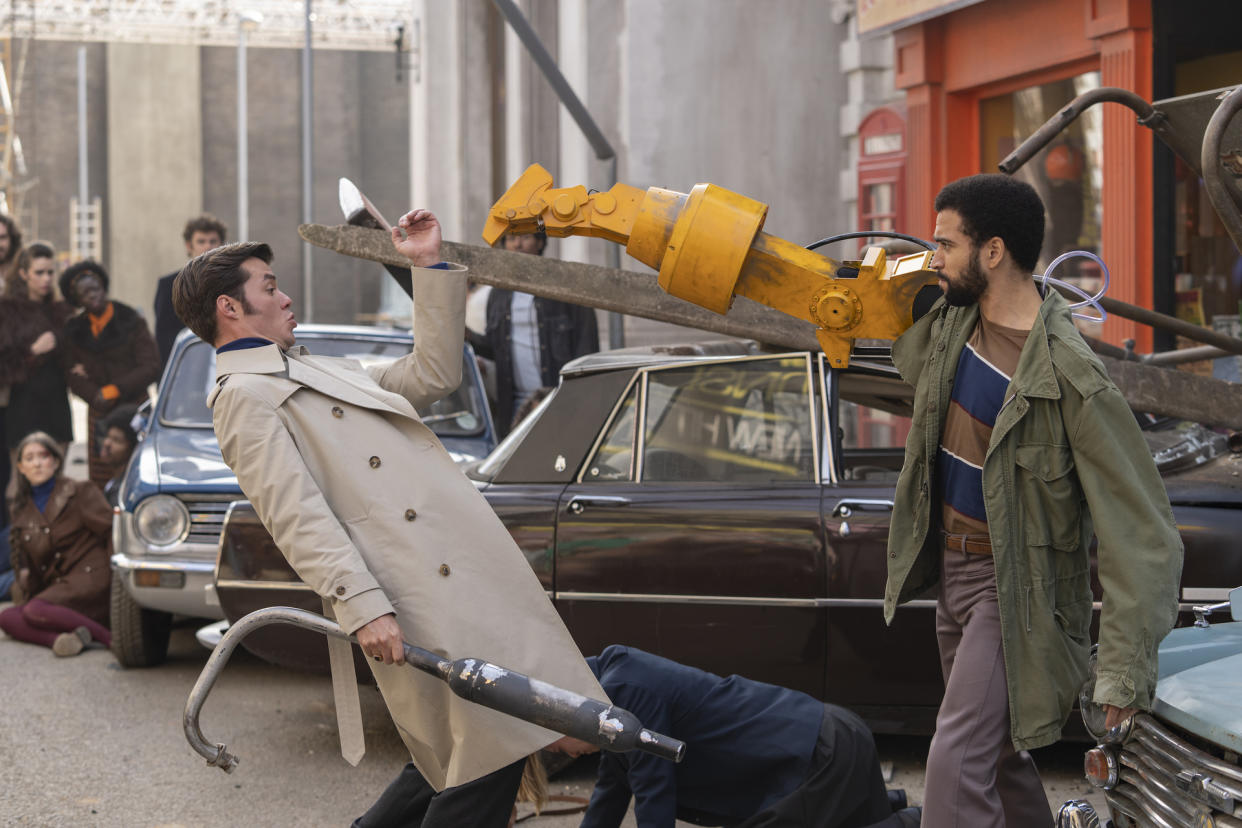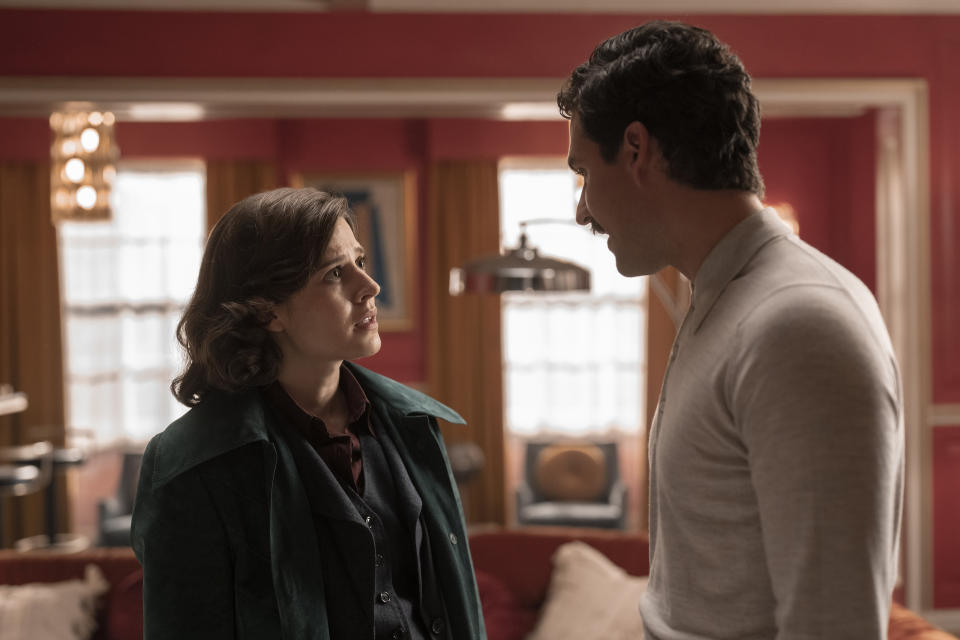HBO Max’s ‘Pennyworth’ Shows Best Way to Rethink IP

- Oops!Something went wrong.Please try again later.
“Pennyworth” isn’t exactly the same show in Season 3 that it was during the opening two years of its run on the soon-to-be-rebranded Epix. What began as a well-executed thought experiment — “What if Batman’s kindly caretaker was a Bond-style government contractor when he was in his twenties?” — has gradually morphed into something different. The opening credits theme has sanded off a bit of its orchestral flair, the show now has the unwieldy subtitle “The Origin of Batman’s Butler,” and the London surrounding its main character is absorbing more and more “Mad Men” pastels by the episode.
Yet, with all those changes, “Pennyworth” is the rare bright spot amid a litany of baffling-to-fatal decisions for HBO Max in 2022 (a list that got longer and graver just in the last few days). The streaming service that at its debut seemed like a home for some its namesake’s spirit of creative freedom has quintupled down on brandable series and movies. While those decisions should rightfully give the TV and film worlds concerns about their respective futures, “Pennyworth” is proof that shows born from intellectual property gambits can still be quality programming. It’s an unexpected kind of blueprint for making a show with some source material DNA that doesn’t feel like a corporate piece of dot-connecting.
More from IndieWire
Pierce Brosnan: I Lost Out on Tim Burton's 'Batman' Thanks to 'Stupid' Superhero Joke
Darren Aronofsky Pitched His R-Rated 'Batman' to Warner Bros. 15 Years Too Soon
1. It makes the “biggest” characters feel normal.
Alfred may be the one with his name on the show. The most interesting ongoing case studies in “Pennyworth,” though, are the Wayne family, most recently seen in a mind trap death loop in the standout episode from fellow Season 3 HBO Max standout “Harley Quinn.” While that show used an absurd setup to unpack the much-fetishized death of Batman’s parents in a more insightful way than pretty much any DC property before it, “Pennyworth” finds its own intriguing, indirect way to get people to care about the famous “Zorro” attendees.
Yes, “Pennyworth” does establish in its corner of the canon that each of the Waynes were expat spies trying to hide their government entanglements from the other. Yet the pace of Martha (Emma Paetz) and Thomas (Ben Aldridge) moving from flirty acquaintances to spouses gives them a way to connect that isn’t solely based in thwarting plots or getting out of bloody standoffs. Even though their last name is what keeps them in the show, talk of billionaire fortunes and Wayne family legacy doesn’t take up as much focus as them being people falling in love (with the worst timing possible). Their waning moments in Season 2 take the kind of narrative zag that would be surprising in most other quasi-prequels. Here, for a show with plenty else besides “getting to Baby Bruce” on its mind, it’s par for the course.

Colin Hutton/HBO Max
2. There’s no pressure for the main character to be just like his predecessors.
It cannot be overstated how immediately comfortable Jack Bannon feels on screen in the role of Alfie. It doesn’t take very long in that first season for him to go from a guy taking Michael Caine’s accent for a test drive to someone cementing his own younger version of a well-known character. The name “Pennyworth” gets said enough over the course of the show that he’s not exactly fashioning a brand new character out of whole cloth, but there’s plenty enough in his charismatic spin on this that he’s not just sliding into an origin story framework.
It’s something that writer/creator Bruno Heller had to sidestep pretty regularly on “Gotham,” winking at past versions of members of the rogues gallery while giving them other reasons for being. This Alfie exists somewhere in between triumphant superagent and mopey antihero. He’s got battle-honed instincts that have saved countless lives, including those of the royal family. There’s a revolving door of women he romances in the upstairs room at his mom’s place. He takes jobs that are glaringly bad ideas. He’s stubborn, even petulant at times, particularly when it comes to avenging the deaths of those close to him. For as much as that new subtitle seems like the show is trying to make him out to be something superhuman, it’s more the case that he’s good at making well-connected friends and getting out of tight jams.
3. It embraces its own weirdness.
Maybe better than any other show of its kind, “Pennyworth” understands that having an alternate view of the world doesn’t mean it can’t draft off a shared history. On the list of characters you’d expect to be in a Batman-adjacent prequel “Aleister Crowley” is not one of them. Yet, quicker than you can say “Strange Angel,” he pops up on the outskirts of the show’s opening seasons. It’s one of those early episodes’ tricks to create a world that sometimes feels like a hallucination while keeping Alfie and Daveboy (Ryan Fletcher) and the rest of the crew tethered to the ground.
It’s also not locked into any particular style. The first season embraces a spy revenge streak, while the follow-up episodes were closer to a political thriller. After a Season 3 time jump, “Pennyworth” is in detective show mode, tracking down clues in a way that sometimes even gets the faint whiff of an “X-Files” vibe. The decision to have rotating characters narrate the “Previously on…” intros for each episode of this new HBO Max season is totally in line with the substance-inspired style that leads “Pennyworth” to expand its own possibilities.

Colin Hutton/HBO Max
4. Fascism isn’t just a plot point or an aesthetic.
The two Epix seasons of the show laid the groundwork for an English Civil War, one that drew less on recreating real-world circumstances and more showed just how the slow creep to authoritarianism happens in comics stories, too. In “Pennyworth,” the political movement built from the Raven Society is enabled by people who cozy up to power. It harnesses military power under the guise of charismatic leaders promising a preservation of a certain way of life. That message appeals to TV viewers and preys on their nationalistic leanings. And, in the end, the most dangerous people aren’t the snarling ravers making dictator speeches, but the sniveling fascists behind the scenes who love to bend institutions to their own purpose before eliminating them altogether.
Is it odd that this roundabout political commentary comes on the heels of episodes featuring the late Queen Elizabeth II making googly eyes at Alfie and his cute little widow’s peak? Inescapably. Do the Prime Minister’s rousing words of the inevitability of freedom winning out ring a little hollow? At times, yes. But even as “Pennyworth” starts sliding into a world of “People With Enhancements” and indulging a little in staring in awe at what these new powers can achieve, there’s a skepticism of that power already baked into the DNA of the show. Watching that in contrast to this world’s next generation, with a world-famous vigilante at the center, will be a fascinating square for the show to circle as it continues.
5. It’s not beholden to the rules of time or lore or physics.
The show’s biggest in-world threat to date comes in the form of a tiny vial of liquid. Sure, it was an allegory of sorts for nuclear war, the idea that control of one weapon could help annihilate an entire population. It’s how the show’s characters resolve that threat — against the backdrop of some personal drama Alfie helps stir up — that gives rise to Captain Blighty, the closest thing “Pennyworth” now has to a superhero. The “Pennyworth” recipe takes a bit of absurdity and a dash of comic book logic, and the final product has delicious hints of both.
There’s no real reason for Black Sabbath songs to pop up in this show a decade before they “should have” existed, but “Pennyworth” is driven by what makes it interesting rather than what makes it a good addition to the greater DC world. It’s the perfect guiding principle for a show where anachronisms don’t really exist. Apart from broader expectations for the characters still to come, “Pennyworth” is sticking to the idea that there’s really no wrong way to tell this story: no detail too bizarre, no jump in logic too big.
“Pennyworth: The Origin of Batman’s Butler” releases new episodes Thursdays on HBO Max.
Best of IndieWire
From 'Reality Bites' to 'Fatal Attraction,' Keep Track of All the Upcoming Film-to-TV Adaptations
7 New Netflix Shows in October 2022 — and the Best Reasons to Watch
Sign up for Indiewire's Newsletter. For the latest news, follow us on Facebook, Twitter, and Instagram.

